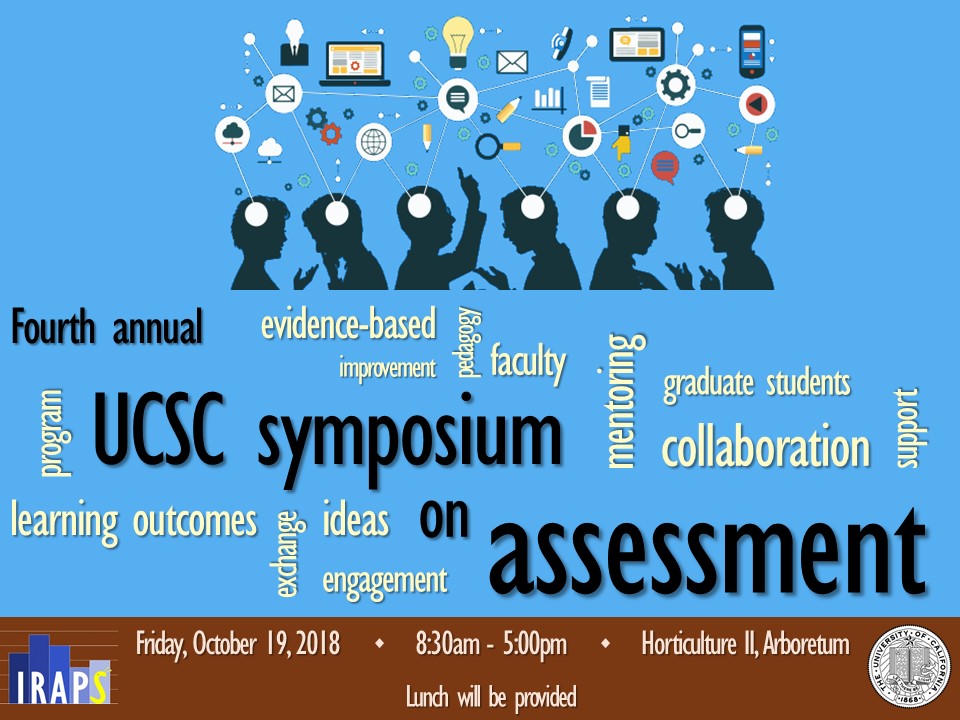2018 Symposium on Assessment of Learning

2018 Symposium on Assessment: Practices and Strategies
The fourth annual Symposium on Assessment of Learning was held on October 19th, 2018.
This event featured presentations and discussions by faculty, assessment specialists, Student Success/Student Affairs staff, and graduate students from UC Santa Cruz and four other UC campuses.
9:00 Welcome and Opening Remarks
Jody Greene, Associate Vice Provost for Teaching and Learning
Director, Center for Innovations in Teaching and Learning, UC Santa Cruz
9:10 Session 1. Conducting program-level assessment in undergraduate programs
Faculty and staff from UC Santa Cruz, Davis, and San Diego will share their experiences and ideas about conducting assessment with the goal of informing course- and program-level decisions.
- Assessing Writing Improvement in a Disciplinary Communication (DC) course: Expect the Unexpected, Jody Greene, Literature Department, and Anna Sher, IRAPS, UC Santa Cruz
- A yoked approach to course and program assessment: A pilot study on sustainable assessment practices using Canvas LMS, Heather Hether, Department of Communication, UC Davis
- Assessment that Leads to Understanding of Students’ Mathematical Preparation to Inform and Enact Student Success Interventions from Algebra to Calculus, Susan Rinaldi, Teaching + Learning Commons, UC San Diego
Q&A
10:30 Coffee Break
10:45 Session 2. Assessing the impact of course-level innovations in teaching and learning
UC Santa Cruz faculty will share their experiences with assessing the impact of teaching practices to better support student learning in large classes.
- An Evaluation of Learning Outcomes for A Large Lecture Biology Course, Robin Dunkin, Ecology & Evolutionary Biology Department, UC Santa Cruz
- Measuring the Impact of Structured Learning Opportunities on Student Experience and Learning in a Large Physics Course, Alexander Sher, Physics Department, UC Santa Cruz
- Next Steps: Using Assessment to Develop a Comprehensive Writing Curriculum in Sociology, Tonya Ritola, Writing Program, UC Santa Cruz
Q&A
12:00-1:00 Lunch Break
12:30-1:00 UCSC Arboretum Tour led by Dr. Martin Quigley, Executive Director
1:05 Session 3. Rethinking the value of assessment from a student perspective
Round table discussions will focus on a variety of topics including:
- using assessment tools such as rubrics, surveys, and self-reflection assignments as teaching tools in undergraduate programs and graduate programs;
- impact of using rubrics for grading on students' perceptions of their skills;
- helping students understand and articulate skills they acquire in courses and co-curricular and extracurricular programs.
1:50 Coffee Break
2:00 Session 4. Assessment of learning in Student Success/Student Affairs units
Capturing Career-Readiness Competencies Beyond the Classroom at UC San Diego, Shawna Hook-Held, Engaged Learning Tools Specialist, Teaching + Learning Commons, UC San Diego
Focusing on Learning Outcomes to Create New Practices and Tools in the Career Center and a Campus-Wide Framework to Facilitate Students’ Career Readiness, Barbara Silverthorne, Sheila Rodriguez, John Rembao, Caitlin Stinneford (Career Center), and Anna Sher, IRAPS, UC Santa Cruz
Q&A
3:30 Closing Remarks
Questions
For questions or more information, please contact: Dr. Anna Sher ( asher@ucsc.edu)
Materials from previous symposia
The UCSC Symposium on Assessment featured presentations and round-table discussions by faculty, graduate students, and assessment staff from UC Santa Cruz and other UC campuses. Over 60 participants attended annually to share their experiences and ideas.
-
The 2017 Symposium topics included facilitating cultural change through programmatic assessment, cultivating academic assessment, contextualizing criteria to measure and improve students' skills, working with faculty on graduate program assessment, and graduate students' experience with undergraduate teaching.
-
The 2015 Symposium topics included assessing student learning, evidence-based improvement, and mentoring graduate students in pedagogy and assessment.
-
The 2014 Symposium topics included establishing a collaborative process of Program Learning Outcome assessment, mentoring graduate students in assessment, approaching assessment as pedagogy, and presenting assessment skills on the job market and in tenure and merit review.
